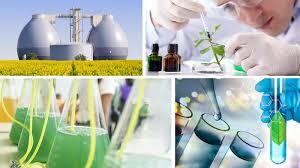What is industrial biotechnology?
Biotechnology is a promising
field which utilizes organic procedures for the life sciences industry. It
controls hereditary qualities of microorganisms and endeavors biomolecular and
cell procedures to deliver basic things like hormones, anti-infection agents
and numerous others. Critical zones of biotechnology incorporate biosimilars,
natural item application, and numerous others.
Modern
biotechnology is a standout amongst the most encouraging new ways to deal with
contamination anticipation, asset protection, and cost decrease. It is
frequently alluded to as the third wave in biotechnology. In the event that
created to its maximum capacity, mechanical biotechnology may largely affect
the world than medicinal services and agrarian biotechnology, It offers
organizations an approach to lessen costs and make new markets while ensuring
the earth. Likewise, since a significant number of its items don't require the
extensive audit times that medication items must experience, it's a speedier,
less demanding pathway to the market. Today, new mechanical procedures can be
taken from lab concentrate to business application in two to five years,
contrasted with up to 10 years for drugs.
The
use of biotechnology to modern procedures is changing how we fabricate items as
well as furnishing us with new items that couldn't be envisioned a couple of
years prior. Since mechanical biotechnology is so new, its advantages are as
yet not outstanding or comprehended by industry, policymakers, or buyers.
From
the earliest starting point, modern biotechnology has incorporated item
enhancements with contamination avoidance. Nothing delineates this superior to
anything the way mechanical biotechnology tackled the phosphate water
contamination issues in the 1970s caused by the utilization of phosphates in
clothing cleanser. Biotechnology organizations created chemicals that expelled
stains from attire superior to anything phosphates, in this way empowering
supplanting of a dirtying material with a non-contaminating bio based added
substance while enhancing the execution of the final result. This advancement
significantly diminished phosphate-related algal blossoms in surface waters the
world over, and at the same time empowered purchasers to get their dresses
cleaner with bring down wash water temperatures and associative vitality
investment funds.
Simple
mechanical biotechnology really goes back to no less than 6000 B.C. at the
point when Neolithic societies aged grapes to make wine, and Babylonians
utilized microbial yeasts to make brew. After some time, humankind's
information of aging expanded, empowering the generation of cheddar, yogurt,
vinegar, and other sustenance items. In the 1800s, Louis Pasteur demonstrated
that aging was the aftereffect of microbial action. At that point in 1928, Sir
Alexander Fleming removed penicillin from form. In the 1940s, substantial scale
maturation procedures were produced to influence modern amounts of this ponder
to tranquilize. Not until after World War II, be that as it may, did the
biotechnology transformation start, offering ascend to current modern
biotechnology.
Since
that time, modern biotechnology has delivered chemicals for use in our day by
day lives and for the assembling part. For example, meat tenderizer is a
chemical and some contact focal point cleaning liquids contain catalysts to
evacuate sticky protein stores. In the fundamental, modern biotechnology
includes the microbial creation of compounds, which are particular proteins.
These proteins have advanced in nature to be super-performing biocatalysts that
encourage and accelerate complex biochemical responses. These astounding
protein impetuses are what make mechanical biotechnology such an effective new
innovation.
Mechanical
biotechnology includes working with nature to boost and upgrade existing
biochemical pathways that can be utilized as a part of assembling. The modern
biotechnology upset rides on a progression of related advancements in three
fields of investigation of definite data got from the cell: genomics,
proteomics, and bioinformatics. Thus, researchers can apply new methods to an
expansive number of microorganisms extending from microscopic organisms,
yeasts, and parasites to marine diatoms and protozoa.
Modern
biotechnology organizations utilize many particular systems to discover and
enhance nature's compounds. Data from genomic contemplates on microorganisms is
helping analysts exploit the abundance of hereditary decent variety in
microbial populaces. Scientists initially scan for catalyst delivering
microorganisms in the regular habitat and afterward utilize DNA tests to look
at the sub-atomic level for qualities that create compounds with particular
biocatalytic capacities. Once disengaged, such catalysts can be distinguished
and portrayed for their capacity to work in particular modern procedures. In
the event that essential, they can be enhanced with biotechnology strategies.
Numerous
bio catalytic apparatuses are quickly getting to be noticeably accessible for
mechanical applications as a result of the current and sensational advances in
biotechnology systems. Much of the time, the biocatalysts or entire cell forms
are new to the point that numerous substance designers and item improvement
authorities in the private part are not yet mindful that they are accessible
for arrangement. This is a decent case of an "innovation hole" where
there is a slack amongst accessibility and broad utilization of another innovation.
This hole must be overcome to quicken advance in growing more financial and
feasible assembling forms through the combination of biotechnology. "New
Biotech Tools for a Cleaner Environment" gives sensational delineations of
what these intense new devices can do. The report means to start more
enthusiasm for this effective innovation, to help close this innovation hole,
and encourage advance toward a more maintainable future.




Comments
Post a Comment